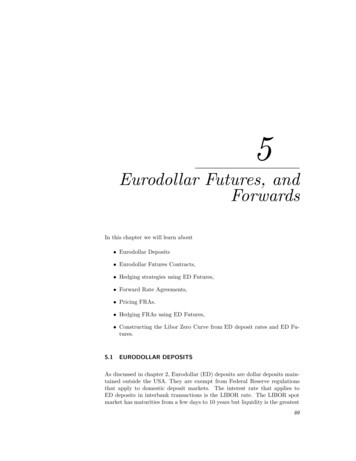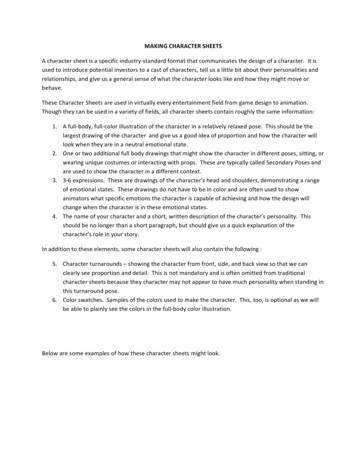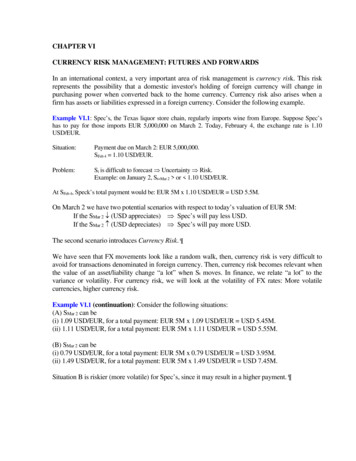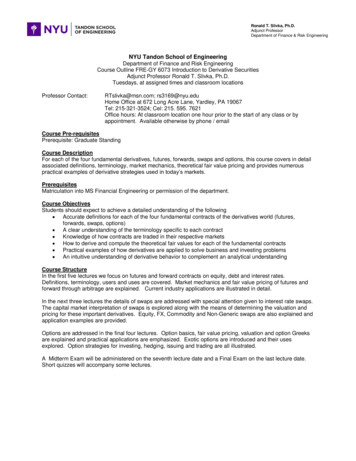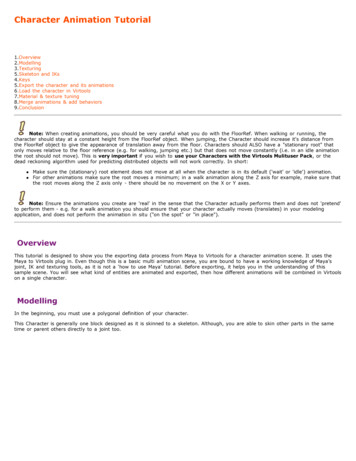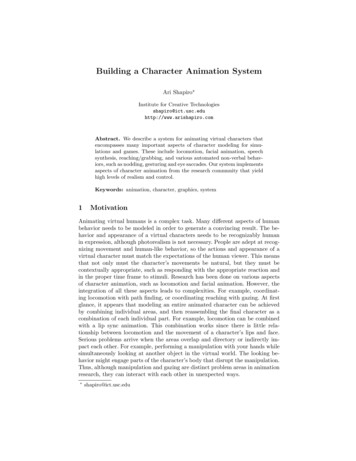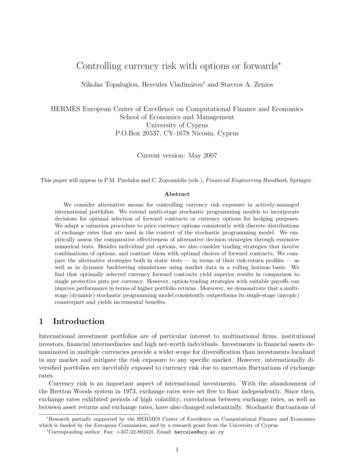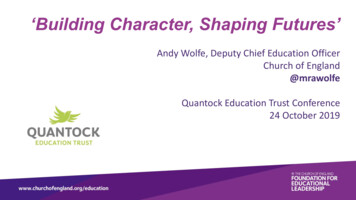
Transcription
‘Building Character, Shaping Futures’Andy Wolfe, Deputy Chief Education OfficerChurch of England@mrawolfeQuantock Education Trust Conference24 October 2019
Opening Reflection: Whatkind of education?
“Your vocation inlife is where yourgreatest joy meetsthe world’sdeepest need.”FrederickBuechner
“Vision is a pictureof the future thatproducespassion.”
Leadership of Character Education:Developing Virtues andCelebrating Human Flourishing inSchools (2017)Available to download free atwww.cefel.org.uk/character
‘Deeply Christian, Serving theCommon Good’ – publishedAutumn 2016 Leadership, Pedagogy andTheology brought together Clear vision for education forall schools, not just churchschools Educating for life in all itsfullness
Educating forWisdom, Knowledgeand SkillsEducating forHope and Aspiration‘Life in allits fullness’Educating forCommunity andLiving Well TogetherEducating for Dignityand Respect
Educating for Wisdom,Knowledge and Skills:Fostering discipline,confidence and delight inseeking wisdom andknowledge, and fullydeveloping talents in all areasof life.
Educating for Hope andAspiration:Seeking healing, repair andrenewal, coping wisely withthings and people goingwrong, opening horizonsand guiding people intoways of fulfilling them.
Educating for Communityand Living Well Together:Ensuring a core focus onrelationships, participation incommunities and thequalities of character thatenable people to flourishtogether.
Educating forDignity and Respect:Ensuring the basic principleof respect for the value andpreciousness of eachperson, treating eachperson as a uniqueindividual of inherent worth.
How can we evaluate the prevailing educationalnarratives?Every ChildMatters(2003)Your child,your schools,our future(2009)Theimportance 16)Schools thatwork foreveryone(2016)
How can we evaluate the prevailing educationalnarratives?‘A buildingwith 4 wallsand tomorrowinside’Imaginegreatness.Knowledge isPower‘Building abetter world,one studentat a time’‘Be safe. BeKind. Besmart’LearnersToday.LeadersTomorrow.
How can we evaluate the prevailing educationalnarratives?Everypercentagepoint countsTheir results?My job.Narrowing thehorizons of learning– keeping it tightuntil May in Year 6Most children matter,some matter morethan othersYour child?Our unit ofeconomiccapital
Leadership of Character Education:Developing Virtues andCelebrating Human Flourishing inSchools (2017)Available to download free atwww.cefel.org.uk/character
seeks to develop and celebrate the flourishing of individuals,communities, families and societiesis fundamental tothe pursuit ofacademicexcellenceCharacterEducationinvests in a legacy far beyond theschool gates, impacting young peopleas friends, neighbours, parents, teammembers and employeesis central to a Christianvision for education for‘life in all its fullness’is caught implicitly through rolemodelling and relationship, andthe deliberate embedding ofleadership virtues in staff teams
Performance UnderPressure - TCUPCHARACTERWhere does this come from?Can you be disadvantaged incharacter? If so how? Whatwould need to happen to buildthis?What achievements mattermost? How much does onesubject impact another? Whoknows about myachievements? Do they needvalidating?ACHIEVEMENTSelf-affirmation,Peer Praise,Increased RiskTaking in Learning
“Leaders who love their pupilsrecognise the transference offear that can ensue frommacro to school to teacher topupil, and care deeply for themental health and wellbeing oftheir pupils, taking great carewith them, particularly atpressure points ofexaminations.”MACROTransferenceof Fear?SCHOOLTEACHERPUPIL
“Leaders who love their pupilsrecognise the transference offear that can ensue frommacro to school to teacher topupil, and care deeply for themental health and wellbeing oftheir pupils, taking great carewith them, particularly atpressure points ofexaminations.”MACROTransferenceof Hope?Building ofCharacter?SCHOOLTEACHERPUPIL
Leading Character Education for Wisdom,Knowledge and Skills“The extent to which leaders can model, develop and celebratepractical wisdom within their context is pivotal to the success of theirschool and the flourishing of their community. This is a vision forleaders who wish to fully embrace the pursuit of academic excellence,but also to fully pursue the development of their pupils’ characterformation, and their human flourishing in its fullest sense. Charactertraits are not simply switches to be turned on and off, or lessonobjectives to be achieved, but necessitate school leaders’ long-terminvestment in their formation, and the patience of wisdom that comeswith this.”
Leading Character Education for Hope &Aspiration“The development of character is a long-term prospect. It is not easilymeasured or tracked, may not obviously change in the course of eachone-hour teaching period, and is not a linear journey. Hope can colourand enhance each interaction, and will change the language used inthe most challenging conversations. Indeed, the embodiment of hopeby the school leader may be one of the most fundamental buildingblocks for learning of any pupil. It is not simply a matter of hoping thatthings get better of their own accord, but demonstrating confidence inthe notion that God is at work through his grace, for humanflourishing to occur.”
Leading Character Education for Community andLiving Well Together“Human flourishing cannot occur in a vacuum – it is an inherentlysocial phenomenon or experience. Very few character virtues canmake much sense without reference to other people, as they usuallyimply an outworking in action towards another. The extension of theschool’s definition beyond its own walls can be a key measure of theeffectiveness of its approach to character education; those that havereally grasped the nature of service will be doing so far beyond theobvious boundaries of their school community, and will becontributing significantly to the flourishing of society at large.”
Leading Character Education for Dignity andRespect“Dignity is a necessary pre-cursor to academic learning and progressin any effective classroom, and is a key starting point for thedevelopment of character. In treating another person with dignity,effective school leaders embrace the individual regardlessof background and pre-conception and assume that anything is (still)possible. They provide necessary and targeted resources for virtuedevelopment, including patience where necessary, and champion avision of personal growth in character that is relentlessly celebrated atevery turn. In so doing, they are doing as Jesus did, in “paying specialattention to the disadvantaged, excluded, despised and feared”
“If the Vision for Educationfails to make and sustainmeaningful connectionsbetween a school’s ethosand its outcomes, it willbecome nothing more thana deeply eloquent andwell-meaning piece ofwriting ”
What outcomes are you trying toimprove? What are the pressures andchallenges? Who defines this journey? What help could the Vision offer you?ethosenhancingHow do you define this for your school?(in a sentence ) Where does your ethos come from? What are the commonalities and differences betweenus? What difference does it make to your lived reality?outcomes
Available for:20 School LeadershipIssues17 Governance Issues18 MAT LeadershipIssues
CHARACTER EDUCATION If character is formed and revealed ‘in the dramaof ongoing life’, how are we actively developingour students’ ability to ‘approach the future’well? Does character develop in young people’s badexperiences, and learning to deal with them well?Educating for Hope andAspiration When you celebrate great leaders or figures fromhistory in the curriculum or in collective worship,do you focus on their achievements or theircharacter development?How are you teaching your pupils about‘relationships and commitments’ and how doesyour staff team embody and model what youmean by this?Educating for Community &Living Well Together
BREAK
RethinkingResilience
“ we had no rest, but we were harassed at everyturn – conflicts on the outside, fears within.” (7.5)“We were underpressure, farbeyond our abilityto endure” (1.8)“Therefore, since wehave such a hope, weare very bold” (3.12)RethinkingResilience“But since you excel in everything – infaith, in speech, in knowledge, incomplete earnestness and in the lovewe have kindled in you – see that youalso excel in this grace of giving.” (8.7)“Therefore sincethrough God’s mercywe have this ministry,we do not lose heart.”(4.1)““But we have thistreasure in jars of clay toshow that this allsurpassing power is fromGod and not from us. Weare hard pressed onevery side, but notcrushed; perplexed butnot in despair; persecutedbut not abandoned; struckdown but not destroyed.”(4.7-9)
“A Christian understanding of resilience ismore than simply bouncing back,grit, toughness or ‘stickability’. In our mostchallenging or painful times, Godis atwork in us, both as individuals andteams – guiding, strengthening, refiningand re-focusing us – as his Holy Spirit helpsus to build our character, be filled withhope and to thus bouncestronger.”back
BreneBrown,‘DaringGreatly’
And when we struggle Richard Rohr, ‘Falling Upward’ (2012)“The human ego prefers anything, just aboutanything, to failing It is not that suffering or failuremight happen, or that it will only happen to you ifyou are bad (which is what religious people oftenthink), or that it will happen to the unfortunate, orto a few in other places, or that you can somehowby cleverness or righteousness avoid it. No, it willhappen, and to you !”
And when we struggle Richard Rohr, ‘Falling Upward’ (2012)“ Losing, failing, falling, sin and the suffering thatcomes from those experiences – all of this is anecessary and even good part of the humanjourney It takes a foundational trust to fall or to fail – andnot fall apart. Faith alone holds you while youstand waiting and hoping and trusting.”
VisionTrustValueJoySustaining Momentum andBuilding Teams –Fuel Gauge modelBishop Paul Williams
VisionTrustValueJoySustaining Momentum andBuilding Teams –Fuel Gauge modelBishop Paul Williams
Leadership of Character Education:Developing Virtues andCelebrating Human Flourishing inSchools (2017)Available to download free atwww.cefel.org.uk/character
IntroductoryWhatleadershipquestions should yoube asking .?Whatpedagogicalquestions should yoube asking .?Whattheologicalquestions should yoube asking .?Questioning/DebatingWhat kind ofHow do you invest inWhat impact does acurriculum time do you your staff character as astaff member’sgive to characterleader?character have on theirformation – is it explicitperformance as aor implicit?teacher/leader?Which matters more toHow do your lessonsIn an individually basedyou when you’reallow students toassessment system,marking- character orappreciate theirhow do you promoteachievement?differences?and improve groupwork?Does God value thedevelopment of ourcharacter over ourachievements andfailures?EmergingDoes character formprimarily throughdifficult or painfulexperiences?What is the role ofsuffering in characterformation?ChallengingHow do you test andevaluate character atinterview?Could a studenteffectively fail everycourse, but see theircharacter formedpositively throughfailure?How does characterrelate to humanflourishing andAristotle’s concepts of‘eudaimonia’?
The Church of England Foundationfor Educational Leadership’s mission is:“To develop inspirational leaders whoare called, connected andcommitted to delivering theChurch of England’s vision foreducation”
Called:“Leaders who are called can articulate a strong sense ofpersonalvocation to their role, and demonstrate this through their words,actions and decision making, exemplifying a strong moral purpose,confident vision, and ambitious trajectory of improvement. Forsome, this sense of vocation will be driven by an established or developingfaith commitment. They show integrity, honesty and a deepsense ofresilience, underpinned by their personal sense of vocation as a leader.”
Connected:“Leaders who are connected operate deliberatelywithincommunities of practice, positioning themselves withinpositive relationships that sustain and encourage allparties. Theyembrace interdependence, demonstratecompassion and embody service to others humbly. They createshared identity within their teams and draw colleagues around acommon purpose.”
Committed:“Leaders who are committed exudeenergy and passion in all theyinspiring confidence and faithfulness in theirteams. They are clear about their purpose and resilient in the face ofchallenge. They take long-term decisions and not easily swayed bydo,short-term changes of policy or procedure. They articulate a senseof mission intheir approach to education to which they draw others, and are committed totheflourishing of their pupils and colleagues.”
Theology ofEducationalLeadership PracticesMatrix (2019)
CalledConnectedCommittedEducating for Wisdom,Knowledge and SkillsLeading Learning Refining JudgementCreating Confidence EmbracingInterdependenceDeepeningUnderstanding - DrivingImprovementEducating for Hope andAspirationDeveloping Imagination- Nurturing AmbitionHealing Relationships Pursuing RenewalSustaining Vision Building ResilienceEducating forCommunity and LivingWell TogetherRemoving Disadvantage- Seeking ReconciliationAccepting Vulnerability DemonstratingGenerosityInspiring Faithfulness Embodying IntegrityEducating for Dignityand RespectCelebrating Diversity Enabling FlourishingOffering Encouragement- Encouraging ServicePractising Humility Learning Love
CalledConnectedCommittedEducating for Wisdom,Knowledge and SkillsLeading Learning Refining JudgementCreating Confidence EmbracingInterdependenceDeepeningUnderstanding - DrivingImprovementEducating for Hope andAspirationDeveloping Imagination- Nurturing AmbitionHealing Relationships Pursuing RenewalSustaining Vision Building ResilienceEducating forCommunity and LivingWell TogetherRemoving Disadvantage- SeekingReconciliationAccepting Vulnerability- DemonstratingGenerosityInspiring Faithfulness Embodying IntegrityEducating for Dignityand RespectCelebrating Diversity Enabling FlourishingOfferingEncouragement Encouraging ServicePractising Humility Learning Love
NetworksMAT PSN – 300 schoolsRural Schools Networks – 250 schoolsNSLN –70 schoolsRegional PSN – 250 schoolsResearch and ResourcesVision ResourcesTheology of Educational LeadershipMAT Leadership Network – 25 MATsInternationalFarmington ScholarshipsLonger-term research – Oxford GatheringLeadership Fellows – C/C/C, LeadershipJournalProgrammesWider Leadership DevelopmentCofEPQH – 150 participants across 5regions (expanding to 240 across 8 regionsfor 2020)DELP – 2 cohorts of 18 current/aspiringDDEsMAT Governance Programme – with CSTNational Conference – 6 Feb 2020SIAMS LD ResourcesGrowing FaithCurriculum DevelopmentWider Stakeholders (Ofsted, CCT, NGA,CST,Unions etc.)
We flourish becauseof our diversity lourishingChildren
What couldthis look likefor Teachingand Learning?
Learning PlantationLearning Rainforest‘A right way to do things’ – set routines – e.g. Nourishing individual talents - highL.O. on the board every lessontrust/high challengeLeaders driven by compliance to externalvoicesGreat variety in pedagogy and OK to try newthings all the timeT L focused on what can be examinedIf creative approaches deliver, there is highlevel of autonomyData has very high statusData is part of the picture of learningInterventions heavily focused on short-termgainsT L structures are dynamic/organic, aligningT L to stated school valuesCreativity becomes rules – e.g. standardisedhomework format etc.Highly personalised CPD
We flourish becauseof our diversity lourishingChildrenWe flourish at differenttimes and differentspeeds
A garden that’s bursting into life ?
We flourish becauseof our diversity andrelationshipsFlourishingTeamsWe flourish at differenttimes and nWe flourish whenwe stop doingthings
Whatshould westop doing?
We flourish becauseof our diversity andrelationshipsFlourishingTeamsWe flourish at differenttimes and differentspeedsFlourishingAdultsWe flourish so wecan look outwardsand giveFlourishingChildrenWe flourish whenwe stop doingthings
“But since you excel in everything – in faith, inspeech, in knowledge, in complete earnestnessand in the love we have kindled in you – seethat you also excel in this grace of giving.”(2 Corinthians 8.7)
We flourish becauseof our diversity andrelationshipsFlourishingTeamsWe flourish at differenttimes and differentspeedsFlourishingAdultsWe flourish so wecan look outwardsand giveFlourishingChildrenWe flourish whenwe stop doingthings
Still buildthecathedral
Reflection – 1 Corinthians 13If I tirelessly teach five outstanding lessons a day, and see my studentsmake excellent progress against their targets, but have not love, I amonly a broken window or a wall covered in graffiti.If I create a perfect climate for learning, have excellent meetings withparents and resolve all the problems of the day through focused toil,but have not love, I am only an uneaten school dinner or a messyoffice.If I give all I have to my school and work a 70 hour week, marking,planning, preparing and evaluating and have the most perfectcolour-coded action plan to guide my path, but have not love, I gainnothing.
Reflection – 1 Corinthians 13Love is patient. Love is kind. It does not envy, itdoes not boast, it is not proud. It is not rude, it isnot self-seeking, it is not easily angered, it keepsno record of wrongs.Love does not delight in evil but rejoices with thetruth. It always protects, always trusts, alwayshopes, always perseveres. Love never fails.
‘Building Character, Shaping Futures’ Andy Wolfe, Deputy Chief Education Officer Church

